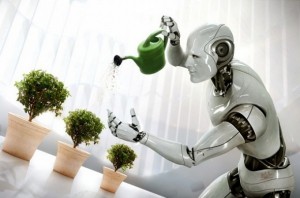All Sciences Lead to Robotics

Ever since the stories of Isaac Asimov, robotics had long been restricted to the imagination. Although it had been unclear in the past, the present state of technology shows that robotics has become a tangible reality. The evolution of robotics follows the same course that was once followed by the evolution of the PC and computers. Long restricted to industry and large laboratories, the computer had finally entered the domestic market primarily in the form of games, and then, as a working tool. Similarly, the evolution of robotics started through the use of robotic arms in the automotive industry, and are now appearing in our homes in the form of small toys, educational robots and also as the first domestic robots such as robot vacuums. The next phase is the logical (and inevitable) appearance of several “functional" robots; robot workers which perform different chores in our companies or at home and work safely alongside us for the well-being of their human "masters". Today we are experiencing a revolution in the world of robotics with unprecedented technological development. One does not need to be a visionary to understand that robotics will significantly transform our lives in the coming decades. The world of robotics is changing rapidly and will soon reach a technological (and disruptive) milestone that will further promote expansion. The robotics market has been identified by several experts throughout the world as a major force of change that will transform the world as we know it. This transformation has already begun and will accelerate, pushed forward by the exponential evolution of information technology whose price / performance ratio seems to double roughly every 18 months. Robotics has created opportunities everywhere and in every sector and its applications are only limited by our imagination. Many countries want to position themselves to take advantage of this emerging industry; Japan, Europe, South Korea and the United States are all at the forefront. There is consensus among experts that robotics is considered a critical and strategic industry of the 21st century that has been and will continue to create new businesses and new quality jobs. That being said, although mankind in general has had difficulty predicting the future, this does not prevent us from philosophizing: what is the future of robots and what role will they take? We don't know for certain, but robotics technology will likely be everywhere and will take different forms; sometimes it will be very easy to identify like in the form of a robotic arm or a humanoid robot, while in other cases they may be almost invisible or even integrated inside our bodies. In all laboratories around the world, from small businesses to RobotShop's secret labs :), GoogleX and more, the roboticists are preparing to revolutionize the world ...
The excitement and interest in service robotics is predictable simply because of the sheer force of evolution which is generated by the emergence of newly available technology at a reasonable cost. The opening of these markets attract young and creative people who study robotics to be able to create new and useful robots. This massive new shift in society will entail having to develop purely robotics teaching programs to create a specialized workforce geared towards to the manufacturing of robots - an industry that will be growing and expanding quickly. Governments will then be inclined to invest heavily in new robotic programs for schools, as well as in private and public laboratories in order to keep their countries on the cutting edge. This will lead to the creation of more wealth in the form of very useful / practical robots. The fact that more and more people share their environment with increasingly intelligent machines will require a psychological study of human behavioural traits in the presence of robots, with the aim of establishing a code of ethics for manufacturers as well as laws for the safety and well-being of the humans who use them. Therefore as always, governments and businesses will want to be leaders in this new quest, labelled by some science journalists as "the fantasy of creation". The logic / objective behind that is of course economic gain, and the goal is financial. But there is more; the first group / country to be able to develop useful and highly intelligent robots will be recognized as one of the most "creative groups", and the country itself could claim it is more advanced than others. This is similar to the Race to the Moon during the Cold War. Therefore the objective is more than just financial, the aim is heavily political. But still, long-term repercussions on the quality of life of individuals is significant; providing an environment that promotes pleasure, knowledge, security and freedom for all.
There are not only the roboticists who are working to bring us this not-so-distant technological future. I actually like to say that "all sciences lead to robotics". Take for example a robot arm with five degrees of freedom and equipped with a gripper, a microcontroller and a sensor for detecting the presence of an object:
- We need computer scientists to create the microcontroller and give intelligence to the robot;
- We also need physics to calculate the gravitational forces on each joints and develop the mathematical model to do the calculations required to predict the correct trajectories for the gripper to be able to capture an object;
- Then the mechanical and electronic engineering come into play in the development of the mechanical structure itself as well as the electronic circuits. These engineers also work on the implementation of the motors to ensure that electromagnetic noise is limited.
If we continue this exercise and put the arm on a humanoid platform:
- The biological sciences and the study of biped creatures become critical to creating walking algorithms; robots sensors also become more complex and will force us to study how the eye works;
- In order to place this humanoid at the same level as a human in terms of intelligence, the study of the brain and neural networks is needed to create a real artificial intelligence;
- Connect the robot to the Internet so the robot has access to almost all of mankind's resources and knowledge and now you touch all the science of Information Technology;
- Add an artificial skin capable of feeling touch and now you include material sciences.
Finally the moment will come when we must give increased autonomy to our new friend, one of the biggest problem in mobile robotics, which leads us to:
- Power generation and storage, which currently deals with battery chemistry;
- Space exploration where it may be possible to bring back helium 3 located in abundance on the surface of the planets that don't have atmosphere, so we can finally develop en enjoy a nearly infinite source of clean energy source with miniature nuclear fusion reactor.
Imagine thousands of robotic applications on land, sea and air, on this planet or elsewhere, we will need to access and make use of all the knowledge acquired by mankind since the creation of the great Library of Alexandria.
Interestingly, the advancements in each of these sciences is now helped by machines, robots and artificial intelligence. Technology itself is involved in its own evolution which helps further improve and accelerate the rate of change. All sciences inevitably lead to robotics and this is why robotics is considered a critical industry and is now in full expansion. The next ~10 years will be the most important in terms of strategic positioning and this decade is considered the first wave of this "technology push" of this emerging industry. Several countries all around the world recently announced billions of dollars of investment in the field of robotics and related sciences. 2020 will mark the point where the main players will be established and the market will move to the second wave of the robotic evolution from "Technology Push" to "Customer Pull" and will be much faster and much more widespread than the first wave. Transformative technology will have been developed and the economies of scale will make robots accessible to all and should appear in every house; we’ll have a robot for every task and a robot for every human being. Studying the evolution information technology (and according to several experts, including my favourite futurist Ray Kurzweil), 2029 will be the approximate date when the robots will successfully pass the Turing Test, or in other words, that artificial intelligence will be equal to that of humans. This new milestone will open the door to a new industrial era, the birth of a new kind of society where technology and robotics will be omnipotent and omnipresent.
It is clear that such an adventure will impact all spheres of society, promoting a better quality of life for ourselves and future generations. This is this reality and this purpose, which is greater than ourselves, that drives me and drives us here at RobotShop to get out of bed every morning and to do our part in advancing our evolution; an evolution leading us to new and better horizons: robotics for better living, robotics at our service!
Thanks for helping to keep our community civil!
This post is an advertisement, or vandalism. It is not useful or relevant to the current topic.
You flagged this as spam. Undo flag.Flag Post






